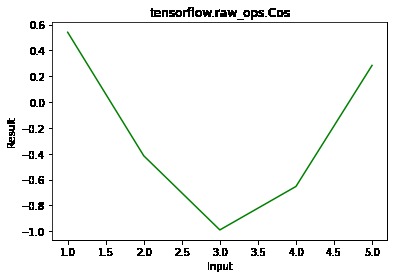TensorFlow是Google設計的開源python庫,用於開發機器學習模型和深度學習神經網絡。 TensorFlow raw_ops提供對所有TensorFlow操作的低級別訪問。 Cos()用於查找x的元素明智餘弦。
用法:tf.raw_ops.Cos(x, name)
參數:
- x:它是輸入張量。此張量的允許dtype是bfloat16,half,float32,float64。
- name(optional):它定義了操作的名稱。
返回值:它返回與x相同dtype的張量。
注意:它隻接受關鍵字參數。
範例1:
Python3
# Importing the library
import tensorflow as tf
# Initializing the input tensor
a = tf.constant([1, 2, 3, 4, 5], dtype = tf.float64)
# Printing the input tensor
print('Input:', a)
# Calculating cosine
res = tf.raw_ops.Cos(x = a)
# Printing the result
print('Result:', res)輸出:
Input: tf.Tensor([1. 2. 3. 4. 5.], shape=(5, ), dtype=float64) Result: tf.Tensor([ 0.54030231 -0.41614684 -0.9899925 -0.65364362 0.28366219], shape=(5, ), dtype=float64)
範例2:可視化
Python3
# importing the library
import tensorflow as tf
import matplotlib.pyplot as plt
# Initializing the input tensor
a = tf.constant([1, 2, 3, 4, 5], dtype = tf.float64)
# Calculating cosine
res = tf.raw_ops.Cos(x = a)
# Plotting the graph
plt.plot(a, res, color ='green')
plt.title('tensorflow.raw_ops.Cos')
plt.xlabel('Input')
plt.ylabel('Result')
plt.show()輸出:

相關用法
- Python Set pop()用法及代碼示例
- Python abs()用法及代碼示例
- Python bin()用法及代碼示例
- Python pow()用法及代碼示例
- Python max() and min()用法及代碼示例
注:本文由純淨天空篩選整理自aman neekhara大神的英文原創作品 Python – tensorflow.raw_ops.Cos()。非經特殊聲明,原始代碼版權歸原作者所有,本譯文未經允許或授權,請勿轉載或複製。
